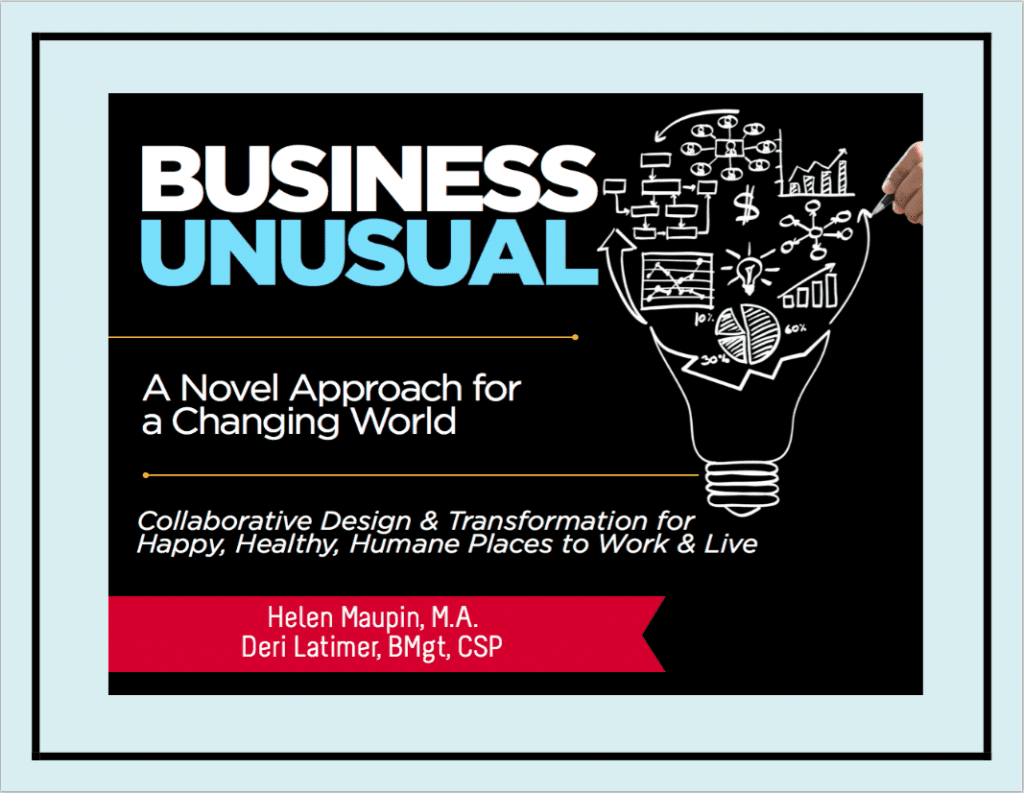
- Designing for Deep Collaboration
- A Novel Approach for a Changing World
Collaborative Organization Design for Happy, Healthy, Humane Places to Work & Live
The Landscape of Greener Grass
Collaborative, adaptive organizations and people are happy, healthy, humane and innovative.
Innovate for Health: iVUCA—interconnected, volatile, uncertain, complex and ambiguous—environments are both challenging and promising. The challenge: many of yesterday’s organization design solutions (command and control structures, systems and processes) are not adaptive during times of turbulence and accelerated change. The promise: creativity and innovation are most evident and effective when people work together in redesigning whole systems—business units, organizations and networks.
Innovate for Happiness: When employees are meaningfully engaged in analyzing and transforming their whole work system, they maximize their value and that of the entire organization.
Innovate for Humanity: Maintaining “a higher level of employee engagement not only contributes toward short-term survival during economic volatility but also is a key factor for longer-term business performance and better positioning when market conditions become favourable.”
Further evidence for a whole system approach—optimizing people, purpose, planet and profit—is documented in the European Union’s 2009 report on the economic benefits of environmental management. Various case studies highlight environmental strategies that deliver on strengthening these major economic outcomes—productivity, innovation, employment, balanced trade, public finances, economic cohesion and a resilient sustainable economy. To stimulate purposeful economic and environmental recovery and growth, businesses consider these elements—the source of their problems, the strategies for optimizing their core business and creating innovative products and services, the systems and structures necessary to enhance their overall performance. This holistic reflection on sources, strategies, systems and structures is integral to the design of adaptive solutions.
The Landscape of Lost Opportunities
Ill health, whether personal, organizational, economic or ecological, costs us billions of dollars and is a major symptom of dysfunctional systems, lost creativity and disabled growth. The World Health Organization predicts by 2020, the second leading cause of disease globally will be depression. Healthy Minds Canada cites depression as the #1 cause of disease in Canada.
Employee mental illness—The Canadian Mental Health Commission estimates 1 in 5 people currently experience a mental health challenge. When considering addictions and stress, it’s more like 1 in 3. Of the total economic burden caused by mental illness in Canada—about $51B/year—a staggering $20B stems from workplace losses.
READ MOREOrganizational dysfunction—Four out of ten employees are not engaged (unmotivated and non-productive) with two out of ten actively disengaged, according to AON Hewitt’s 2013 Report Trends in Global Engagement. These statistics are symptomatic of the worry and stress accompanying recessionary pay freezes, benefit cuts and layoffs. Motivated and productive employees creatively navigate uncertainty and economic downturns—employee engagement is a leading indicator of company growth.
Economic turbulence—The Canadian economy is deeply impacted by productivity losses—an estimated $16.6B last year due to absenteeism—according to a study by the Conference Board of Canada. Economic turbulence resulting from globalization, technological change and deregulation has reached staggering proportions—In any given quarter, 1 in 4 job matches begins or ends, 1 in 13 jobs is created or destroyed, and 1 in 20 organizations closes or starts-‐up. Economic volatility, uncertainty, complexity and ambiguity prevail.
Ecological degradation—Unmanaged urbanization, population and economic growth alongside intensification of agriculture, energy use and transportation are depleting the Earth’s water, air, soil, flora and fauna. A global majority agrees that we must act differently (personally, politically, economically and ecologically) to save our planet and ultimately ourselves.
COLLAPSE